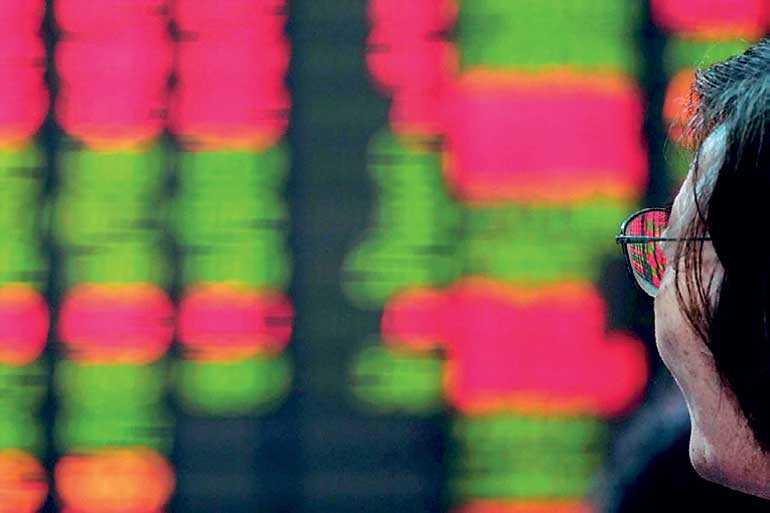Saturday Feb 21, 2026
Saturday Feb 21, 2026
Tuesday, 7 May 2019 00:00 - - {{hitsCtrl.values.hits}}

SHANGHAI (Reuters): Global financial markets reeled on Monday after US President Donald Trump unexpectedly jacked up pressure on China to reach a trade deal in the midst of negotiations, saying he would hike US tariffs on Chinese goods this week.
Equity markets, which have been largely expecting the two sides to reach a trade agreement soon, fell sharply as further talks to end their bruising trade war were thrown into doubt.
The trade war has resulted in billions of dollars of losses for both sides, while inflicting collateral damage on export-reliant economies and companies from Japan to Germany.
Chinese shares plunged more than 6%, while US stock market futures fell 1.6%. Oil prices sank and the Chinese yuan weakened sharply.
The rout is set to continue in Europe. Financial spreadbetters expect Frankfurt’s DAX to open 1.7% lower at 12,207, and Paris’ CAC to open down 1.6% at 5,462. London is closed for a bank holiday.
Trump sharply escalated tensions between the world’s two largest economies with tweeted comments on Sunday that trade talks with China were proceeding “too slowly”, and that he would raise tariffs on $200 billion of Chinese goods to 25% on Friday from 10%.
He also said he would target a further $325 billion of Chinese goods with 25% tariffs “shortly”.
The tweets upended the previously calm market mood that had benefited from signs of improving economic growth in China and the United States, and from comments from Trump and other senior US officials that trade talks were going well. The Wall Street Journal reported on Monday that China was considering cancelling trade talks scheduled for this week following Trump’s threats. Conflicting later reports on Chinese Vice Premier Liu He’s travel plans added to market confusion.
“I think this has got the potential to be a real game-changer,” said Nick Twidale, Sydney-based analyst at Rakuten Securities Australia.
“There is still a question of whether this is one of the famous Trump negotiation tactics, or are we really going to see some drastic increase in tariffs. If it’s the latter, we’ll see massive downside pressure across all markets,” he said.
MSCI’s broadest index of Asia-Pacific shares outside Japan was down 1.9% in afternoon trade as markets across the region fell deep into the red.
Chinese blue-chips were down more than 6%, having closed higher before a three-day national holiday amid expectations that pressures on China’s economy were easing.
The drop in Chinese shares came despite a move on Monday by China’s central bank to cut reserve requirements for small banks to help boost lending to small and private firms.
Australian shares were off 0.8%.
Japanese financial markets remain closed until Tuesday for a national holiday, but Nikkei 225 futures were down 1.9% at 22,075, off the day’s lows.
E-Mini futures for the S&P 500 slid 1.6%, erasing memories of gains on Friday after the US payroll data had helped to lift Wall Street, and signalling a rough open for US stocks on Monday.
“The risk for (Trump) is that the Chinese don’t play ball and don’t go ahead with the negotiation,” said Shane Oliver, head of investment strategy at AMP in Sydney.
“It’s not in his interest for shares to go down as it would hit U.S. business confidence and investment, and that would shoot up unemployment. And that would be a risk for his re-election, too,” he said.
But economists at Citi painted a brighter picture of the outlook for Chinese markets following the recent stabilisation of the Chinese economy.
“Should trade tensions resume, we expect a speedy reaction by China’s policy-makers, with policy implementation made more effective. Given the scope for fiscal and monetary stimulus is large in the near term, we believe the negative impact from additional tariffs will likely be managed better this time,” they said in a note.
More easing on the way?
The flight from riskier assets boosted interest in safe havens, pushing US Treasury futures up 16 ticks. Data from CME Group showed the market now sees a nearly 56% chance of a Federal Reserve rate cut by the end of the year.
Chinese 10-year treasury futures also jumped, with the most-traded contract, for June delivery rising as much as 0.5%. They were last up 0.27% at 96.855.
“The intensified trade and geopolitical risks are likely to prompt the regional central banks for more stimulatory policies,” analysts at ING said in a note. “We expect the majority of Asian central banks meeting this week to cut their policy rates.”
As investors flocked to the safe-haven yen, the dollar dropped 0.3% against the Japanese currency to 110.78.
But China’s yuan plunged, with the offshore unit weakening to 6.8215 per dollar, its weakest level since 10 January, before paring some losses.
The onshore yuan weakened nearly 1% to 6.7980 per dollar before bouncing back to 6.7805.
In contrast to the sharp moves in Asian currencies, the euro was down less than 0.1% on the day at $1.1193, and the dollar index, which tracks the greenback against a basket of six major rivals, was up 0.06% at 97.579.
In commodity markets, Trump’s tweets sparked a plunge in oil prices. US crude at one point dropped as much as 3.1% to a more-than-five-week low, before bouncing to $60.51 per barrel – still off 2.3% on the day.
Brent crude was 2.2% lower at $69.28 per barrel.
The tweets have compounded pressure on prices amid signs of a rise in US output, which has surged by more than two million barrels per day since early 2018.
Spot gold jumped 0.25% to trade at $1,282.20 per ounce.
